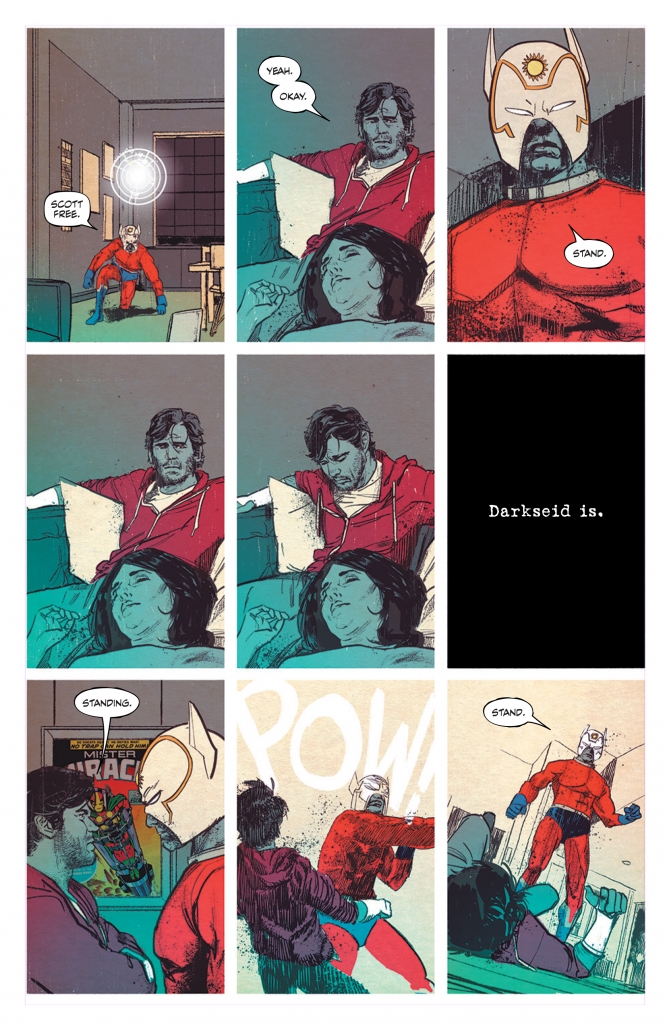The New Genesis of Mister Miracle
Tom King and Mitch Gerads told us about how Mister Miracle, the best superhero book around, came to be.
It’s tough to discuss Mister Miracle, the 12-issue comic series from Tom King and Mitch Gerads, without immediately slipping into hyperbolic praise that runs the risk of over-selling the book, raising expectations to an almost impossibly high degree that almost no comic could expect to meet. Nevertheless, King and Gerads’ Mister Miracle is an era-defining work of comic art, the kind of book that once it completes its run and gets collected as a “graphic novel” will sit proudly on bookshelves next to other DC classics like Frank Miller and Klaus Janson’s The Dark Knight Returns, Alan Moore and Dave Gibbons’ Watchmen, Darwyn Cooke’s New Frontier, and Grant Morrison and Frank Quitely’s All-Star Superman. Even if you’re not familiar with Jack Kirby’s Fourth World characters, which this book is based on, you’ll find plenty to love.
Mister Miracle strips the godliness out of the New Gods, and puts the title character, the world’s greatest escape artist, in a situation he can’t escape from. It eschews typical superheroics in favor of a startling vulnerability, a perspective-altering narrative, and beautiful, uncluttered art. We spoke with King and Gerads about how the book came to be, and some of the deeper meanings hidden within the panels.
Watch the video for some excerpts or read the full interview below!
Den of Geek: How did you go about pitching the concept of this Mister Miracle series?
Tom King: I didn’t really pitch it, I don’t think. This was a consolation prize for us messing up something else. Mitch and I were supposed to do something called “The War of Jokes and Riddles” which ended up being a Batman story. We had planned it out and it was supposed to be this dark series, like The Wire in comics, which was gonna be great for Mitch, and my editor called me and said, “We have great news for you…We want you to do Jokes and Riddles in the main [Batman] series and I was like, “That’s…you just canceled my book!” And they said “No it’s great.”
So I went to drinks with [DC Comics co-publisher] Dan DiDio…and then he drunk me under the table and I was washed out of my mind and he asked “How can I make this up to you?” I said, “Just give me something to write and I’ll write it, whatever it is dude.” And he said “How about Mister Miracle?”
I don’t think we’ve pitched anything since then.
And you went right to Mitch for art on this?
Tom King: No, because we still had some plans that we might do some Batman together. Mitch had done The Activity, Sheriff of Babylon, and The Punisher. These are all sort of grounded dudes with guns and alleyway kind of comics. And I thought [since] we’re gonna do a cosmic comic, Mitch is brilliant at what he does but he can’t do that, too. I mean, there’s limitations. It just turns out I was completely wrong and there are no limitations to Mitch Gerads.
How do you guys work together, because so much of this book feels almost experimental. You had half an issue where there’s all this cosmic mayhem happening and Barda and Scott are talking about remodeling their house. Mitch, how does that come together because so much of that falls on your shoulders?
Mitch Gerads: It’s funny. A lot of people ask, “Oh, do you guys talk on the phone all the time?” We text and direct message on Twitter and stuff daily, but not really about the book. I get a script and I read it, and I’m like 99% sure I know what Tom’s thinking, and I feel he’s the same way. We both try to top each other. Then the book comes out. Most of our conversations aren’t even about the craft of the book.
Of course, plenty of other creators have touched Mister Miracle after Jack Kirby, but you’re really following him. How do you do it?
Tom King: You can’t out-Kirby Kirby. You can’t do cosmic better than Kirby did it. You can’t do more ideas per page than Kirby did. He’s gonna get there first. He’s gonna be smarter than you. He’s gonna have a better imagination. The way we paid tribute to him was instead of doing more Kirby, we almost did anti-Kirby. We tried to be the yin to his yang. He did a story that was huge and cosmic and mind-blowing and we’re like, “What if we took all of that cosmic, mind-blowing stuff and we turned it into a metaphor for one man’s depression, one man’s struggle?”
We paid tribute to him by showing how what he did so big, if we put it on small, it can be hugely impactful. Rather than copy Kirby, we responded to him, and I think that worked. If you think of Kirby [when he created Mister Miracle] he was in his fifties. This is 1968 through 1972, or in that area when the world was turning around. A new generation was coming up that was toppling an old one, and the world seemed very strange. People were being assassinated and the politics of the moment were utterly insane. We’re in another moment now where the world seems insane. It seems to be slipping from our fingers. The world we thought was under our feet is moving, and we can borrow from his metaphor to talk about our time. We can do what he did again.
What do you think is the ultimate message of your Mister Miracle?
Tom King: I was a philosophy major and I never understood why anyone reads literature. I was like, “Why do you look for secret messages in literature when you could just write out the message in philosophy?” The lesson of life or the lesson you get with age is that there are some things you can’t put into words. There are truths about the world that are expressed better in stories. That’s why the Bible is more impactful than The Republic. So, for me to say what the ultimate message is, is impossible, because that’s why I wrote this story.
So what happened to me and how Mister Miracle started out, was in April of ’16. I had one of those first season of The Sopranos panic attacks. The kind where you think you’re going to die and you end up in the hospital, and you’re saying to the doctor, “I’m either dying or crazy, so please tell me I’m crazy.” and the doctor says, “Don’t worry, you’re just insane.” You’re like, “Thank God!”
I had that moment, and after that the world turned upside-down. Both in politics and sports, things happened that I didn’t think could be possible in my lifetime, and it felt to me that there was some disconnect between what’s creating the anxiety, and how to deal with that anxiety. How do you deal with a world that seems like it’s falling apart around you? I found myself putting myself back together, in terms of my mental capacity by turning to my family and turning to my children.
It’s about putting yourself back together in a time of anxiety, being able to live your life in a time of anxiety, hopefully.

Mitch, how do you translate some of that? You can feel that anxiety on the pages, especially in the earlier issues. How did you get that across in the context of all of these strange, cosmic characters?
Mitch Gerads: The real strength is that Barda and Scott are the only two gods that don’t want to be gods. They just want to be normal people and have their house in the suburbs and their cats. You know, the grand American dream. That’s the reader’s way into that normalcy, but again they come from the Fourth World, this crazy place of gods, so they have to deal with that as well. You’re allowed this human experience into that. Through Scott, through Barda, through every character, I just try to get in their head and I know my own anxieties about the world and things like that.
I do photo reference for everyone, for all my shots. I can act in front of my timer on my iPhone. I couldn’t act in a movie or anything like that, but in front of my timer I think I’m pretty good. And then there’s other tricks, like the glitch effects that happen every once in a while. The “Darkseid Is” panels, which force you to stop and live that anxiety for that one panel. You can’t go anywhere else, you have to stop there. There’s all those little tricks to make people a little bit uncomfortable. I think the most fun part of the book, is not the idea of making people uncomfortable, but the idea of really imparting an emotional response just from a comic book.
Would you ever consider revisiting the Fourth World, or is this your final statement on these characters?
Tom King: I think it’s my final statement. As soon as I say that, I’ll re-do it in two years. But for now, until you make a liar out of me, I don’t think I want to write a thirteenth issue of Vision. I don’t want to write a thirteenth issue of Mister Miracle. This is a complete story and it’s meant to be read, almost like a novel at the end.
Mister Miracle is on sale monthly from DC Comics. The next issue, #11, arrives on September 11. The series will conclude in October with its twelfth issue.
Mike Cecchini is the Editor in Chief of Den of Geek. You can read more of his work here. Follow him on Twitter @wayoutstuff.
Read the latest Den of Geek Special Edition Magazine Here!
